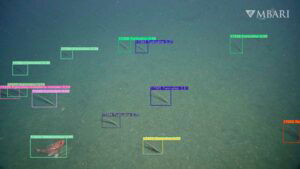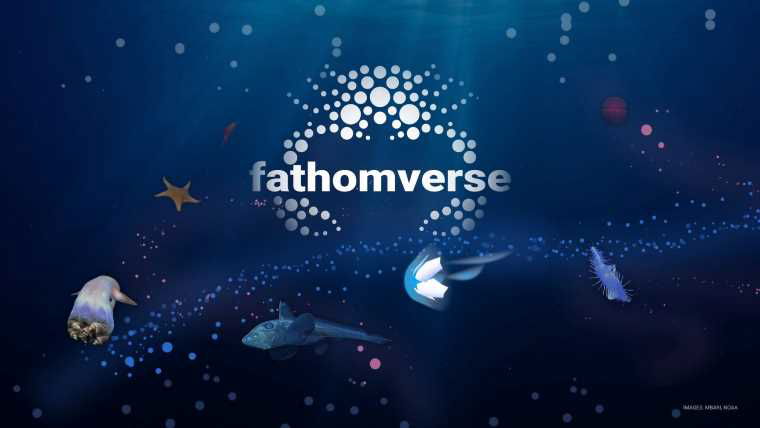The Monterey Bay Aquarium Research Institute (MBARI) has officially launched FathomVerse, an immersive underwater exploration game that will help scientists solve some of the ocean’s most compelling mysteries.
Designed as part of the Ocean Vision AI project, which hopes to train AI to decipher and identify the myriad of discovered and undiscovered life forms that inhabit the world’s oceans, the downloadable FathomVerse app will take the user on an immersive adventure filled with labeled and unlabeled deep sea imagery collected by some of the world’s most sophisticated research organizations.
During each mission, players will explore this detailed imagery captured within areas of the ocean inaccessible to most humans. Players will also share the opportunity to discover new, previously unidentified life forms that call the oceans home.
“Players are identifying animals in imagery that few people in the world, if any, have seen before,” Kakani Katija, the MBARI Principal Engineer who led the development of the FathomVerse game and oversees the Ocean Vision AI program, told The Debrief.
FathomVerse Joins High-Quality Imagery with Immersive Game Play
To better understand the visionary efforts and imagery behind the creation of FathomVerse and elucidate the user experience, The Debrief asked Katija how the huge library of expertly labeled deep sea imagery known as FathomNet was joined with thousands of unlabeled images to create the game’s immersive experience.
“There are 60,000 images in the FathomVerse game at the time of launch,” Katija explained, “almost 10 thousand of which are unlabeled data.”
According to Katija, the thousands of unlabeled images spread throughout FathomVerse included contributions from their own database, the NOAA’s Office of Exploration and Research, the Schmidt Ocean Institute, and Ocean Networks Canada, “with many other data contributions forthcoming.”
“We are releasing unlabeled data in batches over time,” Katija told The Debrief, “and we currently have around a million images in our pipeline.”
By incorporating so much research-quality imagery into the gameplay, the team says that FathomVerse will take players on a deep sea journey. This journey will include the ability to select different missions and mark their progress.
“With a mix of labeled and unlabeled images, FathomVerse creates different combinations for each dive that you play based on your progress and the missions you select,” Katija told The Debrief.
During these missions, players will not only learn about life in the deep but they will be asked to help refine the information already contained within the game. This means that if players see something that doesn’t look like it is labeled correctly, they can flag it for closer analysis.
“Players have the option to flag images when they notice inconsistencies or inaccuracies in the feedback they receive,” Kataji explained. “That same mechanism will be used to flag when something is new or interesting. When an image is flagged, we will elevate it to an expert for review.”


Training AI to SPot Life is the Ultimate Ocean Vision AI Goal
Given the massive amount of data that still needs to be analyzed and the constant pipeline of incoming deep sea imagery expected in the future, the team says that they are not asking FathomVerse players to identify every single anomaly found within their image database. Instead, they say that the entire goal is for humans to train and refine artificial intelligence so it can dramatically increase the pace and volume of imagery analysis.
“AI can help us rapidly process visual data, but first, we need to train AI to recognize ocean animals,” Kataji told The Debrief. “We can’t do this alone, and that’s where FathomVerse comes in.”
Following the long-awaited release of FathomVerse, the MBARI team says they are hoping that the collective experience of players and experts will come together to offer the entire deep-sea research field access to a tool they have never had before.
“Our long-term vision is to enable organizations and groups collecting valuable visual data about ocean life to analyze it efficiently and accurately with the help of artificial intelligence and a global community of ocean enthusiasts playing FathomVerse,” Kataji said.
Perhaps betraying a sense of urgency, the enthusiastic MBARI team leader also noted how the projected and unexpected effects of ongoing climate change are affecting the world’s oceans, accelerating the need for projects like Ocean Vision AI.
“FathomVerse allows anyone with a smartphone or tablet to take part in ocean exploration and discovery while training cutting-edge AI that can help researchers study ocean animals and the impacts of climate change on ocean health,” Kataji told The Debrief. “We need all hands on deck to study the ocean at this critical crossroads.”
Anyone interested in giving FathomVerse a try, it’s now available for download on the App Store and Google Play.
Christopher Plain is a Science Fiction and Fantasy novelist and Head Science Writer at The Debrief. Follow and connect with him on X, learn about his books at plainfiction.com, or email him directly at christopher@thedebrief.org.

